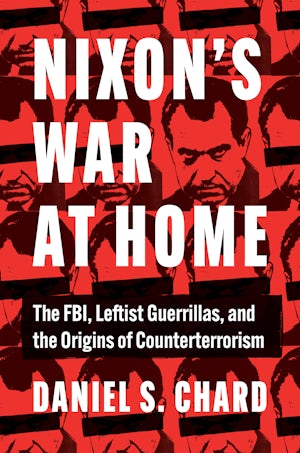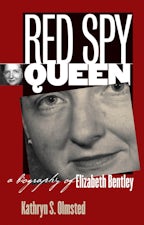Nixon's War at Home
The FBI, Leftist Guerrillas, and the Origins of Counterterrorism
By Daniel S. Chard
384 pp., 6.125 x 9.25, 14 halftones
-
Hardcover ISBN: 978-1-4696-6450-7
Published: September 2021 -
E-book EPUB ISBN: 978-1-4696-6451-4
Published: September 2021 -
E-book PDF ISBN: 979-8-8908-5556-5
Published: September 2021
Justice, Power, and Politics
Buy this Book
- Hardcover $32.95
- E-Book $27.99
For Professors:
Free E-Exam Copies
Connecting the dots between political violence and "law and order" politics, Chard reveals how American counterterrorism emerged in the 1970s from violent conflicts over racism, imperialism, and policing that remain unresolved today.
About the Author
Daniel S. Chard is visiting assistant professor of history at Western Washington University.
For more information about Daniel S. Chard, visit
the
Author
Page.
Reviews
"An immersive and eye-opening account of how the Nixon administration’s fight against the Weather Underground, the Black Liberation Army, and other insurgent groups gave rise to counterterrorism tactics and philosophies of 'punitive policing' that reshaped American politics. . . . Making excellent use of declassified FBI documents, Nixon’s White House tapes, and other sources, Chard shines a light on this turbulent era."—Publishers Weekly
“An impressive first book by a young historian. . . . Nixon’s War at Home offers genuine contributions to the continuing examination of the Long Sixties.” —CHOICE
"Besides being a well-documented research project supported by a robust amount of references, the book is successful in explaining the conceptual development of counterterrorism."—The Society for U.S. Intellectual History
"An ambitious book that engages with several disciplines and historical subfields. Scholars of counterterrorism will benefit from Chard’s analysis of the escalating cycles of violence, and he adds important nuance and clarity to the history of Watergate. . . . Nixon’s War at Home will serve as a critical foundation for further research on the counterintelligence operations that succeeded the COINTELPROs.”–H-War
“Outside of seemingly paranoid circles, counterterrorism was a little-discussed part of the American state long before 9/11. In this incredibly researched and well-written book, Daniel S. Chard guides us into the multiple forms that the efforts to counter insurgencies in the 1960s and 1970s took. Anyone concerned about our freedoms needs to read this, and now.”—Susan M. Reverby, author of Co-Conspirator for Justice: The Revolutionary Life of Dr. Alan Berkman
"With clarity and novelistic freshness, this book offers a persuasive account of the advent of ‘counterterrorism’ as a practice and priority of the U.S. state as it responded to the ‘guerrilla’ violence of the late 1960s and early 1970s. It is also a fascinating, personality-driven story of the bureaucratic infighting that dogged law enforcement. Amidst all of this is a revelatory narrative of the final years of J. Edgar Hoover, long vilified as an enemy of civil liberties, as he attempted to resist Richard Nixon's efforts to interfere with FBI practices, leading to an utterly novel connection between the war on domestic terrorism and the Watergate scandal. Drawing from countless FBI documents and presidential communications, this is a stellar work of history and a major achievement."—Jeremy Varon, author of Bringing the War Home: The Weather Underground, the Red Army Faction, and Revolutionary Violence in the Sixties and Seventies


